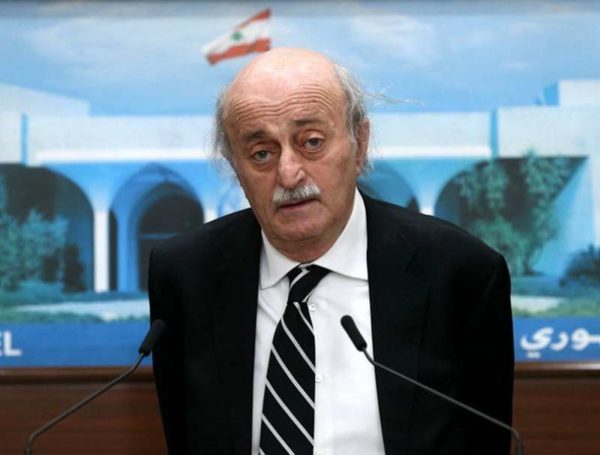By Michael Young
The recent Saudi-Iranian reconciliation is expected to create a positive shock in Lebanon, whose parliament has been struggling to elect a president since last October. However, the mechanisms of a compromise remain unclear. Yet the chances are that one person, Druze leader Walid Jumblatt, will play a significant role in producing a candidate who can appeal to all sides.
A few days before the Saudi-Iranian agreement was signed in Beijing, Hezbollah officially endorsed Suleiman Franjieh as its candidate for the presidency. In retrospect, the move was an astute one. Probably knowing the accord would be signed, the party realised that it was necessary to have a candidate in hand to prepare for negotiations over a consensual figure that the reconciliation would invariably impose on the Lebanese parties.
The problem for Franjieh is twofold: Until now he doesn’t have a majority in parliament that would allow him to win an election, and he is opposed by the three main Maronite Christian parties, which would deny him any communal legitimacy, since presidents come from the Maronite community. Even on the unlikely chance that he could be voted into office, his term would be highly contentious because of hostility from within his community.
This suggests that Mr Franjieh is really more of a bargaining chip for Hezbollah and its allied Shiite party, the Amal Movement. Yet until now, both continue to insist that they will not give up on their candidate. To most people, this is merely a ploy to ensure that any alternative candidate is closer to one that both parties favour. But what mechanism would lead to such a figure?
If Hezbollah and Amal see that a Franjieh victory is out of reach, the most probable scenario is that they will make this known to their candidate, and Franjieh will declare that he is not in the running. Indeed, he never officially announced his candidacy, precisely to avoid the humiliation of being forced to backtrack on this front.
In that case, the search for a compromise would begin, and two figures could play a role in this: Jumblatt and the parliament speaker Nabih Berri, the head of Amal, whose sway in the legislature would be essential to rallying parliamentary blocs to a compromise figure.
In early February, Jumblatt initiated contacts to find a candidate who could appeal to the contending parliamentary blocs. He began his efforts by meeting with a Hezbollah delegation, probably to get a sense of where the party stood. He also started shooting down candidacies that would be perceived as provocative by Hezbollah or its political rivals.
Jumblatt also proposed the names of several Maronite candidates who fit the profile that he believed would best appeal to the opposing blocs. In doing so, the Druze leader positioned himself as a king-maker, but also someone with the local, regional and international contacts to help midwife a solution. This brought him back to the centre on the presidency.
The regional and international dimension is not negligible in choosing a president. Saudi Arabia, through its ambassador in Beirut, made it clear the kingdom would not welcome Mr Franjieh. The French, in turn, reportedly supported his candidacy, assuming that Hezbollah had to be satisfied. However, Jumblatt, apparently agreeing with the Saudis, has stated that Franjieh would not be seen as a unifying figure. Since then, there have been unconfirmed reports in Beirut that Paris was leaning in the same direction.
Jumblatt’s interest in finding a compromise stems from his relationship with the Maronite community. A significant portion of the electorate of the regions under the Druze leader’s influence is Maronite, and Jumblatt always seeks to ensure that the community will not turn against him, as it could threaten his traditional leadership.
Normally, Jumblatt has dominated elections in his geographical area, the Shouf, by playing the Christian electorate off against the Sunni electorate – each of which has a third of votes, alongside Druze voters, who to a significant extent support their leader. Today, however, with the Sunni community in disarray, Joumblatt has less certitude of how Sunnis and Christians might vote, so that he wants to ensure that any new Maronite president will not try to turn Christian voters against his candidates.
Jumblatt’s priority today is above all to anchor the leadership of his son, Taymour, who has taken over the Druze leader’s parliamentary seat. Therefore, if he can help broker a settlement on the presidency, this would greatly strengthen Jumblatt’s position under any new presidential mandate, and by extension reinforce the younger Jumblatt’s standing.
The Druze leader is an experienced political operator and a subtle reader of Lebanon’s political landscape, whose openings he knows how to exploit. When he presented his initiative weeks ago, he wanted to send a message, not for the first time, that given the fact that his bloc effectively holds the balance in parliament, any solution had to pass by him.
Jumblatt represents a community that may number less than 300,000 people. Therefore, punching above his weight is a necessity for the Druze leader to remain relevant. Until now, he has largely succeeded in doing so.
Source: National AE


Leave a Reply
You must be logged in to post a comment.